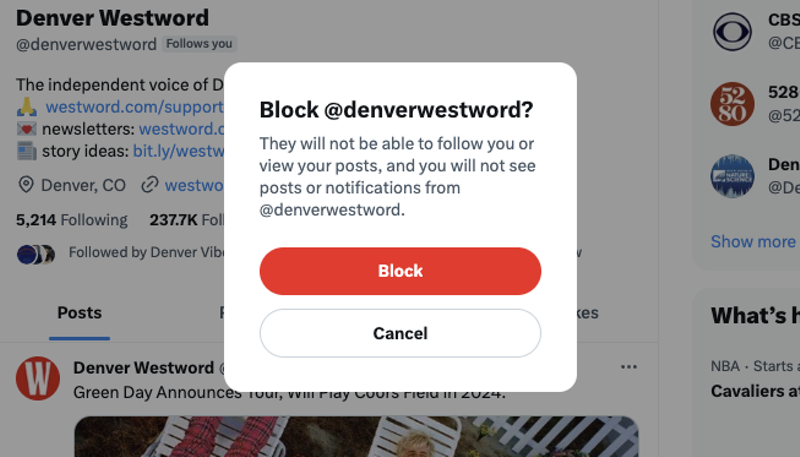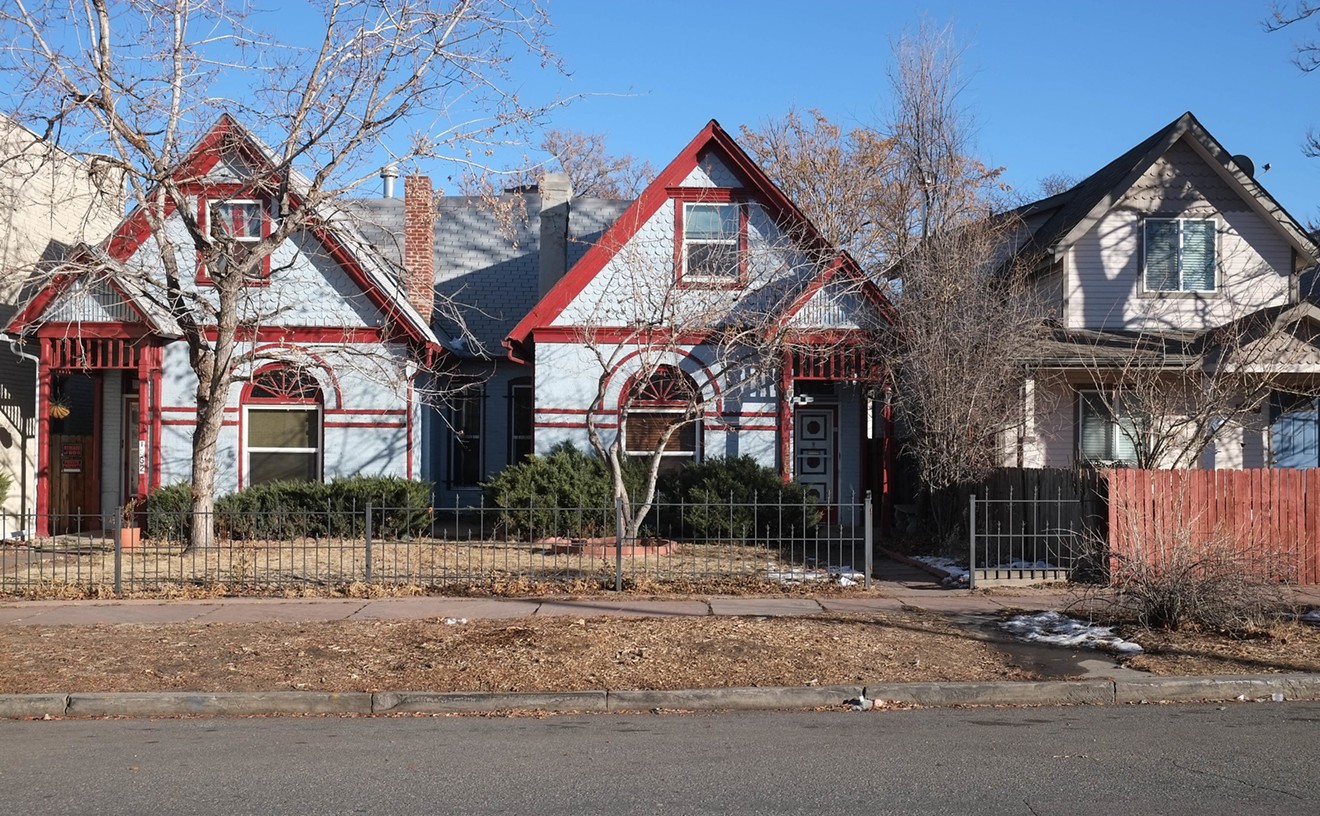“The people don't like you or want your terrorist nonsense. Go away and never come back you disgusting hag.”
Comments like this are commonplace when scrolling through Representative Leslie Herod’s social media pages. Even posts as innocuous as "How to order Girl Scout cookies online" are met with accusations of “supporting pedophilia” and “grifting from the poor people of Denver,” with almost all of the comments coming from the same handful of accounts.
Sometimes, things go further.
"People who tend to come to our pages...they are there to cause harm," Herod says.
As the first openly gay Black woman elected to the Colorado Legislature, Herod’s posts about LGBTQ advocacy and legislation often attract comments from young transgender Coloradans. Herod says these youths have been bullied and harassed by people who see them on her social media, with some commenters even contacting their schools and posting photos of the children on far-right websites. Herod’s friends and family have received similar treatment.
“It's not something that we should have to deal with,” Herod says. “That creates an unsafe environment. … There's a chilling effect when people know that if they comment or ask questions on the page, they will be targeted.”
On her personal social media accounts, Herod handles these situations with a push of the “block” button. Attacking other commenters, posting hate speech and parodying news officials are all offenses that have earned people a spot on Herod’s blocked list.
Blocking might seem like a simple solution for a private citizen, but for elected or appointed officials, the action is currently being debated by the U.S. Supreme Court.
Justices heard oral arguments on October 31 for two cases regarding whether it is unconstitutional for public officials to block people on social media. Lower courts reached conflicting conclusions in each of the cases.
Depending on the Supreme Court’s decision, Colorado politicians may lose their right to block.
The issue has been raised in the Centennial State many times before: Senate President Leroy Garcia, Senator Ray Scott, Lafayette Mayor Christine Berg and Thornton City Council member (now Mayor) Jan Kulmann were all sued for blocking or limiting constituents on social media. They all settled out of court, agreeing to not block constituents in the future.
Without any actual rulings in the cases, state legislators tried to put the blocking question to rest themselves earlier this year, passing a bill to let elected officials block someone from viewing or interacting with their social media pages for any reason, as long as it is a personal social media account doing the blocking and not one attached to a specific political office — even if it is used for official political business.
But now the Supreme Court is debating whether accounts used for public business can be considered personal.
"These pages were used as a tool of governance," attorney Pamela Karlan said during oral arguments last week. "Receiving feedback from constituents is an important part of their duties."
Karlan and other lawyers argued that when public officials use social media to communicate public business, they cannot exclude constituents from the page without violating a constituent's First Amendment rights. Public business could include announcing community meetings, asking for feedback on policy proposals or answering constituent questions.
Colorado law says a public official can block someone if their social media account isn't paid for by government funds, if they have no legal duty to have an account and if the account remains with the official after they leave office. For example, Governor Jared Polis could block people from his personal @jaredpolis X account, but not from his @GovofCO account, which is owned by the state and passed down to each governor.
According to attorney Allon Kedem, whether a public official can block someone should depend on how their social media account is used. Even if the account is personal, if it is the only means for accessing certain information or discussions, then it is a public forum, he argued.
“If there's only one place to go to interact with the city manager about directives that he himself had issued, the fact that he posts a lot about cats or whatever personal thing he wants to post about, doesn't change the fact that if you get blocked off from that page, you're suddenly losing access to a lot of information,” Kedem said during the oral arguments.
The other side likened personal social media pages to private property; just because a politician opened their home for a public meeting or campaign speech at one point doesn’t mean their private residence becomes government property, they argued.
Supporters called for a blocking test similar to Colorado’s law, which aligns with the 6th U.S. Circuit Court of Appeals' ruling in Lindke v. Freed last year.
“People don't have a right to access other people's personal property,” attorney Hashim Mooppan said during the oral arguments. “People have the right, as government officials, to talk about their jobs in their personal capacity. And you should assume that, when they do that on their own personal property, they're acting in their personal capacity.”
Herod says she thinks blocking abusive commenters isn’t about preventing them from participating in a digital town hall, but rather stopping them from disrupting the town hall for others — as they can do in person.
“They can't go into my public town hall and scream at the top of their lungs, ‘You're a groomer!’” says Herod, who sponsored Colorado’s blocking bill. “That is not legal. We have the ability to remove them from our town halls if they're being disruptive. But we don't have that vehicle for social media?”
Not all Colorado legislators want the ability to block people on social media.
Twenty-nine legislators from both political parties voted against the bill, including Senator Chris Hansen, who claims he's never blocked someone on social media, nor felt the need to.
“We're public officials, we're going to get comments,” Hansen says. “We get them by phone, by email, by social media. That’s part of our job.”
Hansen tells Westword he’s received threats on social media before, some along the lines of “I'm going to come get you" and others similar to “If you do this, you're in trouble.” But blocking wouldn’t help, he insists — pointing out how people can (and do) send threats via phone or email instead.
Hansen says legislators can report any serious or alarming social media threats to the Colorado State Patrol. However, like Herod, Senator Mark Baisley notes that he isn't the only one who has to bear the brunt of abusive comments; his constituents do, too.
Baisley has blocked social media users for spamming and for bullying others. He says one of his constituents is a young autistic woman who often responds to his posts with questions, sometimes interpreting posts more literally than others would. When a commenter began insulting her one day, calling her “dumb,” Baisley blocked the user so his constituent could freely engage with his posts without fear.
“I really appreciate a good intellectual banter with people who have a perspective different than mine,” Baisley says. “But when the goal is just to try to tear down, destroy, bully, I think that every social media site-holder ought to have the right to dismiss those people, to block them.”
Colorado’s law goes further, though: Elected officials are permitted to block anyone for anything, not just abuse or harassment.
Herod and Baisley say this discretion is important for situations like theirs, when someone else is the target of online abuse or when comments might not rise to a legal definition of harassment or hate speech. Critics, however, believe it opens the door for politicians to simply block those who disagree with them or their policies.
The ACLU of Colorado fought against Colorado’s bill, calling social media one of the “most powerful mechanisms available to a private citizen to make his or her voice heard."
“Social media provides an important forum for political discourse and public debate,” says Cat Ordoñez, policy counsel for the civil rights group. “Elected officials who use their social media pages for government business need to be conscious of the First Amendment rights of the individuals they block.”
While the Supreme Court is likely several months away from releasing a decision on the matter, justices recognized the ever-growing political power of social media when hearing oral arguments last week.
At one point, Justice Elena Kagan said she thought former president Donald Trump’s Twitter posts were such an important part of history and his presidency that a citizen wouldn't be able to fully understand it without access to Trump's account.
“More and more of our government operates on social media. More and more of our democracy operates on social media,” Kagan said. “This is the forum for officials to talk to citizens, for citizens to talk to officials, for citizens to talk to each other, and it is becoming increasingly so.”
[
{
"name": "Air - MediumRectangle - Inline Content - Mobile Display Size",
"component": "12017618",
"insertPoint": "2",
"requiredCountToDisplay": "2",
"watchElement": ".fdn-content-body",
"astAdList": [
{
"adType": "rectangle",
"displayTargets": "mobile"
}
]
},{
"name": "Editor Picks",
"component": "17242653",
"insertPoint": "4",
"requiredCountToDisplay": "1",
"watchElement": ".fdn-content-body",
"astAdList": [
{
"adType": "rectangle",
"displayTargets": "desktop|tablet"
},{
"adType": "rectangle",
"displayTargets": "desktop|tablet|mobile"
}
]
},{
"name": "Inline Links",
"component": "18838239",
"insertPoint": "8th",
"startingPoint": 8,
"requiredCountToDisplay": "7",
"maxInsertions": 25
},{
"name": "Air - MediumRectangle - Combo - Inline Content",
"component": "17261320",
"insertPoint": "8th",
"startingPoint": 8,
"requiredCountToDisplay": "7",
"maxInsertions": 25,
"watchElement": ".fdn-content-body",
"astAdList": [
{
"adType": "rectangle",
"displayTargets": "desktop|tablet"
},{
"adType": "rectangle",
"displayTargets": "desktop|tablet|mobile"
}
]
},{
"name": "Inline Links",
"component": "18838239",
"insertPoint": "8th",
"startingPoint": 12,
"requiredCountToDisplay": "11",
"maxInsertions": 25
},{
"name": "Air - Leaderboard Tower - Combo - Inline Content",
"component": "17261321",
"insertPoint": "8th",
"startingPoint": 12,
"requiredCountToDisplay": "11",
"maxInsertions": 25,
"watchElement": ".fdn-content-body",
"astAdList": [
{
"adType": "leaderboardInlineContent",
"displayTargets": "desktop|tablet"
},{
"adType": "tower",
"displayTargets": "mobile"
}
]
}
]












